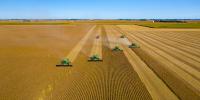The EU should change its agricultural policy if green funds are to become green transition

“I am deeply convinced that agriculture and nature conservation can go hand in hand”, President of the EU Commission, Ursula Von der Leyen, said in her State of the Union speech.
The reason for this statement is a rising opposition among farmers taking place around Europe, most evident in the Netherlands and Ireland whose agricultural production system is similar to that of Denmark.
The resistance is for the main part due to the fact that many farmers feel left behind in the green transition.
But it does not have to be this way. In a new vision report CONCITO, together with a number of other European think tanks and scientists, proposes to change the framework conditions for the agricultural sector in the EU. This would enable farmers to a much higher degree to make a contribution to society’s desire for better protection of the climate, animal welfare, biodiversity and the environment.
Greenhouse gas reductions are still missing
EU’s Common Agricultural Policy (CAP) plays a key role in setting the framework conditions for the agricultural sector, as it affects the economic situation of the farmers, their production methods and their impact on the environment.
The CAP-budget is approximately DKK 2,738 billion in the period 2023-2027, thus making up a third of the total EU budget.
In previous reforms of the CAP, it has been the ambition to reduce greenhouse gas emissions from agriculture as well as improve biodiversity on farmland. But the European Court of Auditors has concluded that these efforts have failed.
It is however important to recognize that the efficiency of the agricultural production has increased significantly. This has had a positive effect globally but has not led to improvements in the EU as production has increased at the same time.
The vision report emphasizes that the main reason why the CAP has failed to deliver on the green policy targets is the policy design and the way the funds are being allocated.
The main part of the funds is still allocated through the basic payment scheme which supports the farmers’ income based on their number of hectares. The funds are therefore neither targeted to the farmers most in need of financial support nor to the environmental and climate actions needed to achieve the EU targets.
Furthermore, the basic payment is capitalized into land prices, thus not supporting the current and future farmers but those leaving the sector and selling their land at high prices.
A new green agricultural policy is necessary
There is a need for a major restructuring of the CAP so that green funds will provide a green transition.
The suggestion is to transfer the already earmarked green CAP funds to a new fund that focuses on sustainable land use and the transition of agriculture. The fund must follow the principle of “public goods for public money”.
This new fund can for example target carbon storage, reduction of greenhouse gas emissions, groundwater protection, good animal welfare, better protection of biodiversity, and improvement of water quality.
The responsibility for the fund should be transferred to the authorities responsible for delivering on climate, animal welfare, environment, and biodiversity, in a close cooperation with the agricultural authorities.
This will ensure a meaningful connection between what we as a society want to achieve and the authorities managing these goals.
Up-coming EU election will be crucial
A major restructuring of the agricultural funds will enable farmers to receive payments for delivering public goods.
Hopefully, this will strengthen the social contract between the agricultural sector and the rest of society.
To make such a comprehensive change of the CAP requires a lot of political work, and to get the work started is urgent.
It is crucial that the new European Parliament as well as the Commission after the election in 2024 have a composition where there is courage and will to take on this important task.
This change could enable delivery on the green EU targets, as well as the prevention of further polarization between urban and rural communities– both elements that are crucial to ensure a sustainable future in the EU.

